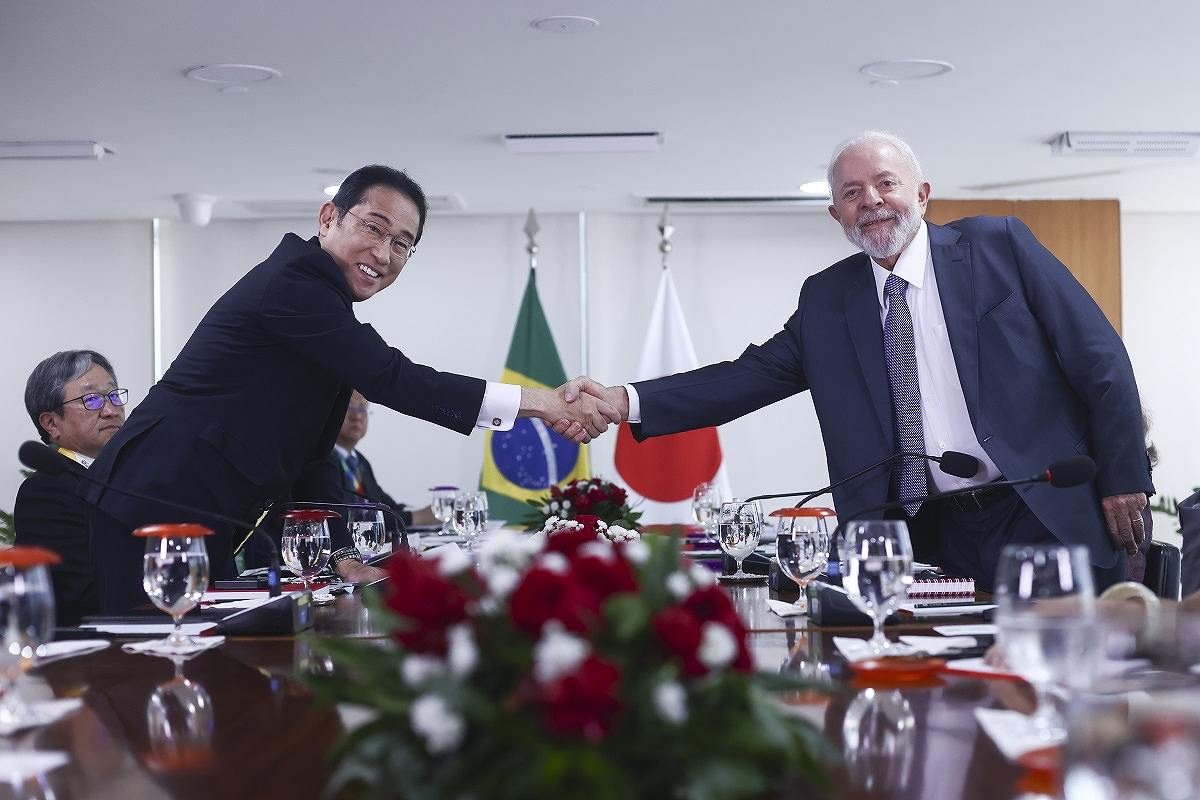Japan, Brazil Leaders Agree to Promote Decarbonization; Emphasize Protecting International Law

Brazil’s President Luiz Inacio Lula da Silva, right, and Prime Minister Fumio Kishida shake hands for the media during a meeting at a presidential palace in Brasilia on Friday.
15:02 JST, May 4, 2024
BRASILIA — Prime Minister Fumio Kishida and Brazilian President Luiz Inacio Lula da Silva have agreed to deepen cooperation in establishing a framework for decarbonization during summit talks in Brasilia.
According to the joint statement issued after the meeting Friday, they also agreed to establish a new high-level vice-ministerial dialogue on decarbonization.
On his first visit to South America since becoming prime minister, Kishida was accompanied by representatives from over 40 companies.
His visit was aimed at reaffirming Japan′s cooperation with Brazil in maintaining and strengthening international order based on the rule of law, a priority for Japan, ahead of November’s Group of 20 summit. Brazil — a major power in the emerging and developing countries collectively known as the Global South — will hold the G20 presidency.
Kishida and Lula launched the “Japan-Brazil Green Partnership Initiative” for cooperation in the field of decarbonization.
The two countries aim to boost business initiatives by combining the strengths of Japan, which has technological prowess in areas such as hybrid car engines, and Brazil, the world’s largest producer of bioethanol.
They also reaffirmed the importance of strengthening economic ties between Japan and member countries of the Mercosur customs union. They designated 2025 as the “Japan-Brazil Friendship Exchange Year.” Kishida also confirmed that Japan would invite Lula to visit Japan.
Looking ahead to the G20 meeting, the joint statement said both countries would prioritize “the fight against hunger, poverty and inequality,” which Brazil has made a key agenda item. They also expressed their commitment to “uphold the rule of law and international law.”
Regarding the escalation of tensions in the Middle East, they called on all parties involved to “exercise maximum restraint” and to uphold the rule of international humanitarian law.
Top Articles in Politics
-

Japan PM Takaichi’s Cabinet Resigns en Masse
-

Sanae Takaichi Elected Prime Minister of Japan; Keeps All Cabinet Appointees from Previous Term
-

Japan’s Govt to Submit Road Map for Growth Strategy in March, PM Takaichi to Announce in Upcoming Policy Speech
-

LDP Wins Historic Landslide Victory
-

LDP Wins Landslide Victory, Secures Single-party Majority; Ruling Coalition with JIP Poised to Secure Over 300 seats (UPDATE 1)
JN ACCESS RANKING
-

Producer Behind Pop Group XG Arrested for Cocaine Possession
-

Japan PM Takaichi’s Cabinet Resigns en Masse
-

Man Infected with Measles Reportedly Dined at Restaurant in Tokyo Station
-

Israeli Ambassador to Japan Speaks about Japan’s Role in the Reconstruction of Gaza
-

Videos Plagiarized, Reposted with False Subtitles Claiming ‘Ryukyu Belongs to China’; Anti-China False Information Also Posted in Japan

























